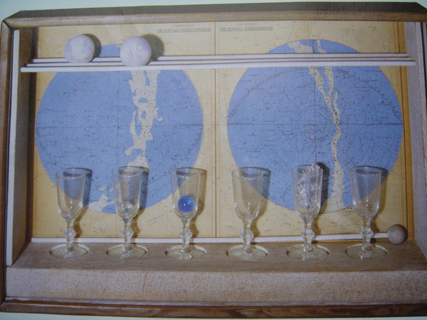Today is Boxing Day so this week’s work of art is a box, by the so-called “American Surrealist”, Joseph Cornell. This artful assemblage of found objects, to which he gave the title Giuditta Pasta (Dedicace), in cryptic homage to a famous Italian opera singer of the nineteenth century, was created in 1950. It can be seen at Tate Modern.
Cornell was born on Christmas Eve 1903 at Nyack, in New York State and attended the Phillips Academy at Andover in Massachusetts. He had no formal training in art and worked for a while as a textile salesman when he was a young man. He lived for most of his adult life in a frame house on the romantically named Utopia Parkway in Queens, New York, to which his family moved in 1929. He shared the house with his mother and his younger brother, Robert, who was physically and mentally handicapped, and for whom he helped to care, helping him to draw or to play with his toy trains. Cornell associated his brother with an ideal of playful, childish innocence – an ideal to which Cornell’s ludic and frequently enigmatic art also seems to aspire. After Robert’s death in 1965, Cornell wrote to a friend that “To the end … he retained the pure joy of the child-mind though cruelly plagued.” Because he spent so much of his time at home, Cornell struck many of his contemporaries as something of a recluse, although he did in fact cultivate close friendships with artists throughout his life. At various times Cornell counted such diverse figures as Marcel Duchamp, Willem de Kooning and Andy Warhol among his friends.
The art of the European Surrealists was a formative influence on his work. In the early 1930s he was particularly struck by the...


